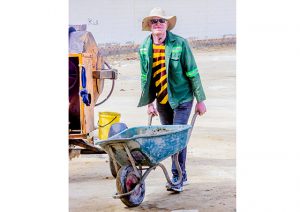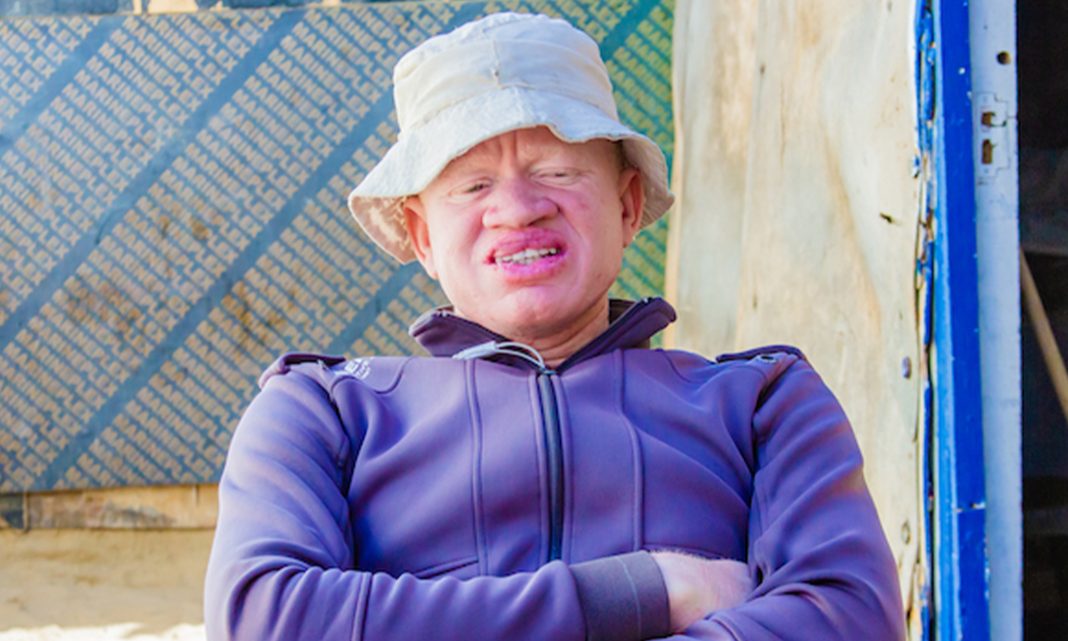By Ester Mbathera | 2 February 2021
WHEN Jeremia Shitana applied for a job at a fishing company a few years ago, his prospective employer turned him down because he was told his skin was too sensitive to work in the sun for long periods.
Shitana, who has albinism, says his sensitive skin often gets in the way of his employment prospects but believes he can do any job.
“Others say I cannot work in the sun the whole day, but in the village, I used to look after the cattle. I can do anything and I know how to protect myself from the sun,” said Shitana (41).
Shitana hails from Onalunika village in northern Namibia and came to realise he was different from his siblings when he was nine years old. Other children in the village would not play with him because they believed he was a ghost or a “man-eater”.
Children born with albinism are seen as a curse by some tribes in Namibia. To others, they are a symbol of wealth. For these reasons, these children are often kept out of public sight.
Shitana is among a few individuals with albinism from his village. It is not a common occurrence in his family. As a toddler, he was not allowed to go to any large gatherings in the village, nor was he allowed to leave the homestead for fear of him being harmed by strangers.
“The children said my mother is a witch and I eat people,” he said.
IN SEARCH OF EMPLOYMENT
Now as an adult, Shitana faces the same obstacles in getting employment as his skin is considered too sensitive for hard labour.

If it was not for his aunt who was enlightened, Shitana would never have seen the inside of a classroom.
“She took me to her house and sent me to school. She made sure the teachers explain to other children that I was harmless. At that school, I made friends. I stayed there until I was in Grade 9 but had to leave because my aunt passed away and no one wanted to help me anymore.
“I was sent back to my mother’s house and was made to do household chores during the ploughing and harvesting seasons. I was also responsible for looking after the cattle,” he said.
In 2004, Shitana decided that living in the village would not give him the lifestyle he desired. He was told about jobs in the fishing industry at the habour town of Walvis Bay by other men from his village.
With some financial assistance from his mother, he accompanied friends on the 900 kilometre journey to Walvis Bay to seek employment.
Seeking employment in the fishing industry is not an easy exercise, especially for young people who have no experience or who do not meet the employment requirements. People can spend months waiting in the sun with the hope of one day finding a casual job to offload boxes of fish from vessels.
“When I arrived here, my friend told me to get a job. I had to go to the fishing factories and ask around for employment. I joined the queue but until today, I still go there now and again with no luck,” he said.
In the meantime, he has been surviving on short-term jobs at private homes and on construction sites.
Shitana is not alone in this predicament. Like him, Israel Haindongo (26) is also living with albinism. He also came to Walvis Bay in 2019 in search of greener pastures and to protect his skins against the harsh Namibian sun.
Haindongo believed that finding a job for someone with his skin condition also contributed to him not being employed.
“The reasons are many. I can’t really pinpoint a specific reason but maybe they look at a person’s appearance, and skin colour,” he said.
Haindongo believes he can do any chore that other people do.
“I am very talented even though many look at my skin colour, I can execute a lot of chores, especially work done in the village that many will not be able to execute. Many do not know what I am capable of. The only challenge is working outdoors in the sun but anything in the shade I can do,” added Haindongo.
His first full-time job was in a fishing factory in 2020 and this too fell through as a result of the ongoing investigations into the Fishrot scandal.
CHALLENGES IN HR MANAGEMENT SPACE
Namibia first published the Affirmative Action (Employment) Act of 1998 on 24 September 1998. One of its aims was to “redress through appropriate affirmative action plans, the conditions of formerly disadvantaged persons in designated groups arising from past discriminatory laws and practices.”
The obvious definition of ‘persons in designated groups’ is not fully defined, leaving out people living with albinism whose only difference is the lack of melanin. The AA Act neither speaks to those who are culturally discriminated against and the disadvantages that follow them throughout their lives. They are treated differently because of their skin colour even at some workplaces.
Kachina Shiluwa and Helena Taapopi are human resources practitioners with over 20 years of experience in the fishing industry.
According to Shiluwa, people living with albinism are like any other person with a disability, they do not stand out when it comes to offering them employment.
“It’s an experience I am starting to take note of and I can’t say we have a lot of people like that,” said Shiluwa.
“From a recruiting space, I have always recognised or placed emphasis on them but from this discussion, it is perhaps something one has to look into when recruiting. We have also not been flooded with employment requests from that specific group of people,” said Taapopi.
Although vacancy adverts always encourage people with disabilities and women to apply, people with albinism are not regarded as having a disability, something that might be attributed to the undefined term of ‘persons in designated groups’.
While most employers are Affirmative Action compliant, the two HR practitioners believe that a request regarding albinism can be looked into if brought forward.
“If there is attention drawn to the fact because we have in the past employed people who come from different ethnic groups, and associations brought it to our attention through the ministry of labour and sometimes we actively seek such applicants,” said Shiluwa.
The founder member of the Support in Namibia of Albinism Sufferers Requiring Assistance (Sinasra) Peter Stoemer says a study done in 2011 has proven that there is no difference in IQ between a person who has melanin and those who lack melanin in their skin.
“The albinism IQ research findings are kept confidential as per the instructions of our health ministry,” said Stoermer.
This, according to Stoermer, is because the report contains highly sensitive information that cannot be released.
According to the 2011 census, Namibia has about 1 560 people with albinism, but this number is disputed. The number is estimated to be close to 2 000 because many children with albinism are hidden from society by their relatives because of the stigma attached to their appearance.
The next census scheduled for this year will provide new data.
– This article was produced with support from the Google Grant.






